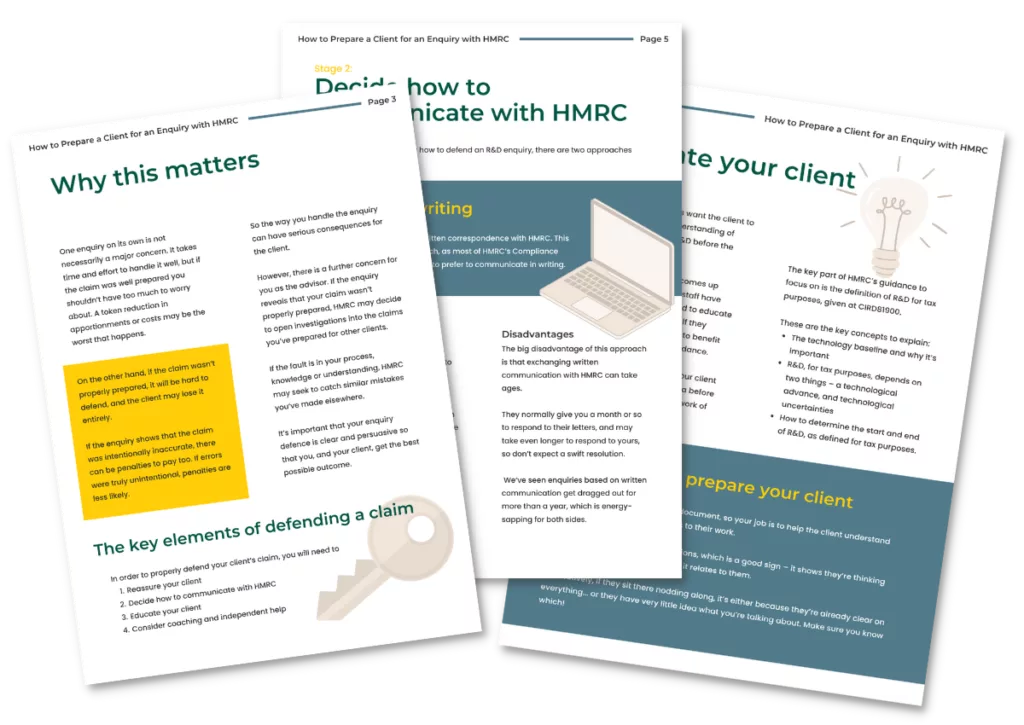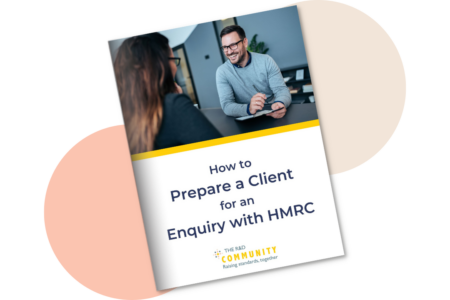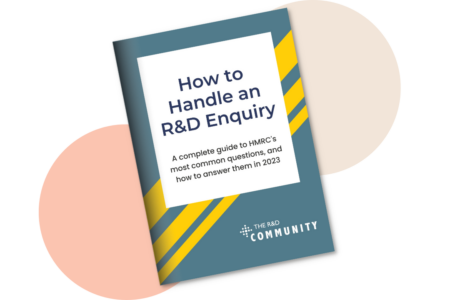The consequences for messing up the enquiry defence can be significant for you, and your client. On the client’s side, they may lose the claim entirely, and could also incur penalties if their original claim is found to be intentionally misleading or inaccurate.
For you, if you’ve charged on a contingent basis you might have to return your fee to the client. You might also lose their business, if things go really badly. And if the client gets a penalty, or a clear error is found in your approach to preparing claims, then the first enquiry could spark off a cluster of enquiries into claims that you’ve prepared for other clients. Generally, enquiries are bad for your costs, and worse for your reputation.
Like I said, there’s no official manual on how to work through an enquiry defence. So, to plug the gap, we’ve prepared a 4-step guide, How to Prepare your Client for an Enquiry with HMRC, to give you all the instructions you need to get going with a strong enquiry defence.

First, Don’t Panic!
Any enquiry is unwelcome, but it’s not the end of the world. The most important thing to do first is to reassure the client that a lot of enquiries are routine. Just because they’re received the letter doesn’t mean they’re going to lose the claim.
You also need to take a deep breath and reassure yourself! If you had confidence in the claim when you prepared it, and are well versed in the rules, then you’re well placed to defend it. Even if you’ve never worked on an enquiry before, with our expert guide, and your own knowledge of the case and HMRC’s rules, you have all the tools you need to prepare a strong defence.
On the other hand, if you’re not feeling confident in your claim – maybe you knew it was borderline, or maybe the enquiry has given you pause – then it’s perfectly reasonable to call in experts for more hands-on support. For example, you could have someone review the original claim to flag any areas which might be less defensible than others and to give you some advice on how to manage your communication with HMRC.

Decide how to communicate with HMRC
Whenever an enquiry comes up you have two choices. You can defend it entirely in writing, preparing documents in response to questions, and often waiting weeks or months to hear back from HMRC with next steps or new questions. This approach gives you plenty of time to get the wording exactly right in your drafts and ensure that everything you say will help your case, not harm it.
Alternatively, you can arrange to speak to your HMRC case worker on the phone or on a video call, along with your client. Instead of months, a meeting means your enquiry can be resolved more quickly. If your client is articulate, knowledgeable and persuasive, it can be easier to get the case worker on side this way. (Just be aware that HMRC will want to hear from your client, not you!)
We’ve shared a full list of the pros and cons in our guide, How to Prepare your Client for an Enquiry with HMRC, which can help you decide what’s best for your client.

Educate your client
The most involved part of preparing to defend a claim is educating your client. They need to understand the enquiry process and the approach you’re proposing to take with HMRC, so you can manage their expectations. As part of that, you’ll want to give them a refresher on HMRC’s guidance, how it applies to their claim, and to make sure they understand their role in the enquiry process.
We always encourage advisors to start the claim preparation process by educating their clients on eligibility. But by the time the enquiry has come round, there’s a good chance they’ve forgotten a lot of what you told them, or lost track of the details. It’s important you give them a refresher, especially if you’re arranging for them to talk with HMRC directly.
There’s a couple of other things you should prepare them for early on as well. Make sure they understand the amount of work required to defend the claim, and the possible timelines.
You also want to make sure they understand the enquiry is not a legal argument, like at a tribunal. Rather than trying to score points on technicalities, they should focus on winning over the case worker by being as helpful and communicative as possible, building a rapport, and working collaboratively, not defensively.
Lastly, it’s important you give them the heads up about penalties. If HMRC decide the claim was intentionally misleading, or careless, they may apply penalties as well as clawing back any tax relief they’ve paid out. It’s rare that this happens, and if all parties have been acting in good faith, they’re less likely to be penalised. But it’s still important to let clients know when and why penalties can occur.
Check out our guide, How to Prepare your Client for an Enquiry with HMRC, for lots more details on how to talk through all these things with your clients, and what to say.

Support for R&D advisors to defend enquiries
If you haven’t already, make sure you download the free guide, How to Prepare your Client for an Enquiry with HMRC. It covers all these steps in more details and is a useful reference for any future enquiries that may come up.
You should also take a good look at our guide to answering HMRC’s questions, How to Handle an R&D Enquiry
If you’d like more hands-on support, you can read about the Enquiry Defence service we offer to our members and discover membership features and pricing.





